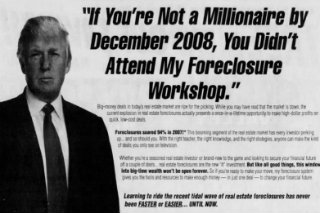 Before the Electoral College even meets and officially votes for Donald Trump as the next President of the United States, the President Elect has an ordeal to go through that has nothing to do with his new job. The trial in the case of Low v. Trump University, which is a civil class action case in which Trump (also named personally in the suit) is accused of “promising, but not delivering access to” lessons about how to use his real estate techniques, as taught by “hand-picked” instructors via the operation of his non-accredited Trump University business classes. And it’s coming up fast, as the fraud trial starts with jury selection on November 28th.
Before the Electoral College even meets and officially votes for Donald Trump as the next President of the United States, the President Elect has an ordeal to go through that has nothing to do with his new job. The trial in the case of Low v. Trump University, which is a civil class action case in which Trump (also named personally in the suit) is accused of “promising, but not delivering access to” lessons about how to use his real estate techniques, as taught by “hand-picked” instructors via the operation of his non-accredited Trump University business classes. And it’s coming up fast, as the fraud trial starts with jury selection on November 28th.
Trumps has, of course, denied the allegations. He is expected to be called as a witness by both the plaintiffs and in his own defense.
This is the same case that led to Trump’s comments about U.S. District Court Judge Gonzalo Curiel, who is presiding over the case. Trump classified the judge as “a hater of Donald Trump […] perhaps [because of] the fact that I’m very, very strong on the border.” He also suggested that “[t]hey ought to look into Judge Curiel, because what Judge Curiel is doing is a total disgrace. OK? But we will come back in November. Wouldn’t that be wild if I am president and come back and do a civil case?”
There are actually two cases merged together, as Trump was also sued personally in Cohen v. Donald J. Trump, which alleges violations of the Racketeer Influenced and Corrupt Organizations Act (RICO). In both cases, the plaintiffs are alleging that Trump made false representations because he “had no substantive involvement in the selection of the Live Events instructors or the content of the Live Events” as well as that “the New York State Education Department warned Trump not to use the ‘university’ title or to continue operating without a license, but he defied those directives.”
The Cohen case adds that the “fraudulent scheme” is in violation of the Racketeering Influenced and Corrupt Organizations Act (better known as “RICO”), which would triple any damages (they’re asking for repayment of tuition fees). Some of the more specific and colorful allegations from the Cohen and Low complaints include:
- Back in 2005, Trump sent out bulk mailings of a “Special Invitation from Donald J. Trump” that would grant you access to “the free introductory Live Event,” with the end result being that “you’ll have what you need to succeed!”
- “Almost immediately,” the New York State Education Department wrote Trump, issuing a warning not to illegally call his operation a “university” without a license, only for Trump to move the official location to Delaware while still operating in New York. In 2010, the NYSED wrote Trump a letter requesting that “[a]ll current students should be refunded” and threatened “disciplinary action.”
- Trump University staffers would, during breaks in between parts of seminars, tell students “to raise their credit card limits four times” to be able to buy real estate on the cards and asked them to prepare financial disclosures. The alleged reasoning for this was to determine how much money students had to spend on additional seminars and get them to charge the seminars to the cards that now had increased limits.
In answering the complaints, Trump denied most of the allegations. It was conceded, though that the NYSED asked for a name change and that the state was investigating them.
All eyes will be on the trial, which is now likely to be the most closely followed civil trial in recent memory. However, since it’s in Federal court, unlike most things Trump, cameras won’t be allowed and we won’t be able to watch it on TV. Also, Trump himself won’t be required to be at the trial, except for when he’s testifying of course.